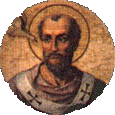September 3: How Great Was Gregory?
Gregory the Great (Gregory I) Becomes Pope (590)
How Great Was He?
It was on this date, September 3, 590, that the son of a wealthy patrician named Gordianus, whose name history does not recall, was made Pope in the Roman Catholic Church. He took the name Gregory and is remembered as Pope St. Gregory I – "the Great." Since Gregory is considered as one of the "good popes," it is instructive to look at Gregory's career and ask: Good for what?
As the first monk to become pope, Gregory could have used his 14-year papacy to promote science and education, encourage democracy over the divine rule of kings and princes, decree the freedom of slaves, uplift the generally low moral character of the people and the clergy through education and social mobility, preach religious tolerance, and otherwise extract Europe from the Dark Ages.
Gregory did just the opposite. His rather convenient belief that the end of the world was imminent aided him in persuading wealthy landowners to leave large estates, and vast numbers of slaves, to the Catholic Church. The Church thereafter became the largest landholder and slave-owner in Europe, with an annual income equivalent to about $3 million.
The new pope was one of the most credulous of men, too. When Gregory took office, Rome was in the throes of famine, pestilence and natural disaster. Instead of useful efforts, like sanitation, Gregory prayed for a miracle. Then, says historian Andrew D. White:
Gregory ... saw hovering over the mausoleum of Hadrian the figure of the archangel Michael, who was just sheathing a flaming sword... the Pope immediately broke forth into hallelujahs for this sign that the plague was stayed, and, as it shortly afterward became less severe, a chapel was built at the summit of the mausoleum and dedicated to St. Michael; still later, above the whole was erected the colossal statue of the archangel sheathing his sword... Thus ... the mausoleum of Hadrian became the castle of St. Angelo.[1]
Gregory's most famous works, Magna Moralia and The Dialogues, are anthologies of superstitious stories about demons and miracles. For example, he told the story of how "a nun, having eaten some lettuce without making the sign of the cross, swallowed a devil, and that, when commanded by a holy man to come forth, the devil replied: 'How am I to blame? I was sitting on the lettuce, and this woman, not having made the sign of the cross, ate me along with it.'"[2]
Gregory strongly believed in the childish Biblical story of creation and was hostile to any form of Biblical criticism. And education, apparently. According to Bishop John of Salisbury, Gregory burned the last surviving books of pagan Rome and, from his extensive output of letters, we learn that Gregory reprimanded a bishop of Gaul for working to restore education there.[3]
As for his treatment of heretics – those who had a different opinion on religious matters – the Catholic Encyclopedia admits Gregory "had no hesitation in accordance with the ideas of his age, in resorting to compulsion, and invoking the aid of the secular arm therein." That little clause, "in accordance with the ideas of his age," is designed to inoculate Gregory from blame for his brutality – as if torture and execution are just fine in the eyes of God as long as everyone else says it’s fine, too.
Indeed, Gregory was clueless about the causative connection between ignorance and low morality. He once appealed to Emperor Maurice to spare him the papacy, but later we learn (again, from his letters) that Gregory delighted when Emperor Phocas deposed and murdered Maurice, perhaps because Maurice had called Gregory "a fool."[4] Gregory endorsed the most vicious monarchs of his time, including Brunichildis (c.545-613), queen of the East Frankish kingdom of Austrasia[5] and Eastern Roman Emperor Phocas (r. 602-610)[6], because they were charitable toward the Church. Indeed, according to the Catholic Encyclopedia, Gregory regarded emperors "as the representative of God in all things secular" and "God's representative on earth."
So much for religion in any way inspiring democracy. As one of the "good popes," Gregory was "Great" as a patron of the Roman Church, but a disaster as a patron of human civilization.
[1] Andrew D. White, Warfare of Science With Theology, 1896, Chapter 14.
[2] White, Chapter 15.
[3] Letters vi, 54.
[4] Letters xiii, 31.
[5] Letters, i, 74; vii, 5, 50, etc.
[6] Letters xiii, 31, 38, 39.
Originally published September 2003 by Ronald Bruce Meyer.


